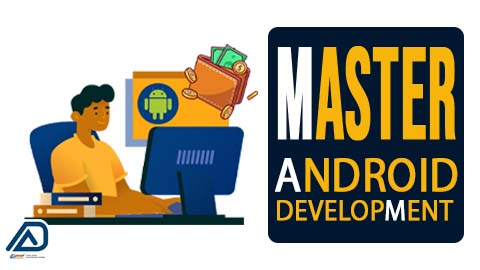Master in Android Development
What is Android Development? Android development refers to the process …
What you'll learn
When learning Android development, you'll acquire a set of skills and knowledge that enables you to create mobile applications specifically for the Android platform. Android development involves various aspects of software development, user interface design, and working with the Android operating system.
Java or Kotlin: You'll learn one of the primary programming languages for Android app development, Java or Kotlin. Both languages are used to write the code that powers Android apps, with Kotlin gaining popularity for its modern and concise syntax.
Android Studio: Android Studio is the official integrated development environment (IDE) for Android development. You'll become proficient in using this tool to write code, design user interfaces, test, and debug your Android applications.
User Interface (UI) Design: You'll learn how to create user interfaces using XML layout files, including designing views, buttons, text fields, and other elements that make up the app's screens.
Activities and Fragments: Android apps are structured around activities, which represent different screens or windows. You'll learn how to create activities and use fragments to build flexible and responsive user interfaces.
Intents: You'll understand how to use intents to facilitate communication between different components of your app and between different apps. Intents are used to request actions or services from other parts of the app or from other apps.
Android Manifest: The AndroidManifest.xml file is a crucial configuration file that describes essential information about the app, such as its components, permissions, and version.
Data Storage: You'll learn how to store and manage data in Android apps. This includes using databases (e.g., SQLite), SharedPreferences, and working with external storage.
Networking: Understand how to make network requests and integrate data from web services and APIs into your Android app.
Notifications: Learn to create and manage notifications to provide updates and alerts to users.
Permissions: Understand the Android permission system and how to request and manage permissions for various device features and data access.
Testing and Debugging: Proficiency in testing your app using the Android Emulator and real devices, as well as debugging and troubleshooting issues in your code.
Publishing on Google Play: Learn how to prepare your app for publication on the Google Play Store. This includes creating assets, writing app descriptions, and following Google's guidelines for app submission.
User Experience (UX) Design: Gain an understanding of UX principles to design user-friendly and visually appealing apps.
Adaptive Design: Learn how to create responsive layouts that adapt to different screen sizes and orientations.
Material Design Guidelines: Familiarize yourself with Google's Material Design guidelines to create apps with a consistent and modern look and feel.
Security Best Practices: Understand best practices for securing your app and protecting user data.
Android APIs: Android provides a vast set of APIs for accessing device hardware, sensors, location, camera, and more. You'll learn how to utilize these APIs to enhance your app's functionality.
Performance Optimization: Discover techniques for optimizing your app's performance, such as background processing, image loading, and efficient memory management.
Offline Support: Learn how to build apps that work offline or in low-network conditions.
Version Control: Use version control systems like Git to track changes in your code and collaborate effectively with others.



